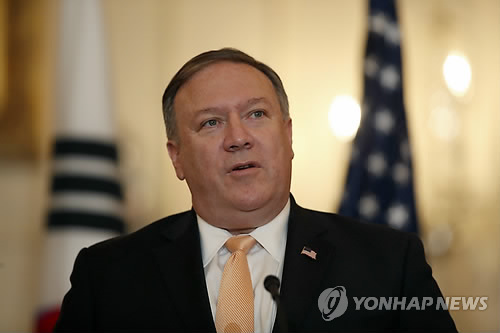U.S. Secretary of State Mike Pompeo on Sunday offered to allow the American private sector to invest in North Korea if the regime agrees to fully dismantle its nuclear weapons program.
Pompeo returned from a trip to Pyongyang last week, where he met with North Korean leader Kim Jong-un to prepare for the June 12 summit between U.S. President Donald Trump and Kim.
"This will be Americans coming in -- private sector Americans, not the U.S. taxpayer -- private sector Americans coming in to help build out the energy grid. They need enormous amounts of electricity in North Korea," he said in an interview on Fox News.

The U.S. will also offer help in developing North Korea's infrastructure and addressing the North Korean people's basic needs "so they can eat meat and have healthy lives," according to the top American diplomat.
"Those are the kind of things that, if we get what it is the president has demanded -- the complete, verifiable, irreversible denuclearization of North Korea -- that the American people will offer in spades," Pompeo said, painting a more detailed picture of possible U.S. concessions to the North.
Pompeo earlier said that if the North takes "bold action to quickly denuclearize," the U.S. is prepared to work with North Korea "to achieve prosperity on par with our South Korean friends."
In a separate interview with CBS on Sunday, the secretary of state said what the U.S. is offering is not taxpayer money, but know-how, knowledge, entrepreneurs, and risk-takers who will work with the North Koreans to help them create a robust economy.
Asked if such concessions could amount to the lifting of sanctions against the regime, Pompeo said there will be more than just sanctions relief if the U.S. can get North Korea to denuclearize.
"The president has a commitment, and he will make this commitment to Chairman Kim, I am confident, that says if you do the things we need to do so that America is no longer held at risk by your nuclear weapons arsenal, and that you get rid of your CBW program and missiles that threaten the world, we will ensure that your people have the opportunity for the greatness that I know Chairman Kim wants them to have," he said, referring to chemical and biological weapons.
The Trump administration has emphasized that it will not follow the paths of past U.S. governments that offered economic aid to Pyongyang in return for incremental steps to freeze its nuclear program.
"We're hoping this will be bigger, different, faster," Pompeo said, adding that only time will tell how negotiations will proceed. "The American leadership under President Trump has its eyes wide open. It could be that we won't be successful. It's possible; we acknowledge that. We've watched this fail before. But the model that has been employed here is fundamentally different, and we are hopeful that we will get a fundamentally different outcome."
Still, he did not rule out that the U.S. could seek a regime change in Pyongyang.
Trump and Kim are set to meet in Singapore to discuss the dismantlement of North Korea's nuclear weapons program. The North has said it will close its Punggye-ri nuclear test site between May 23 and 25.
The U.S. demands an immediate dismantlement of the nuclear program. But Kim has called for a phased and synchronized approach, leading skeptics to believe his real intention is to win sanctions relief and security guarantees.
"We will have to provide security assurances to be sure," Pompeo said on Fox News. "This has been the tradeoff that has been pending for 25 years. No president has ever put America in a position where the North Korean leadership thought that this was truly possible, that the Americans would actually do this, would lead to the place where America was no longer held at risk by the North Korean regime. That's the objective."
Pompeo said he is "convinced" that Kim shares that objective with the American people.
The American diplomat has met twice with the North Korean leader. Their first meeting came in early April when Pompeo was still director of the Central Intelligence Agency.
"The conversations are professional. He knows his brief," Pompeo said of Kim. "He knows what he is trying to achieve for the North Korean people. He's able to deal with complexity when the conversation requires it."
The reclusive leader follows the Western press, he added, and will "probably watch this show at some point."
"He is paying attention to things that the world is saying," said Pompeo.

